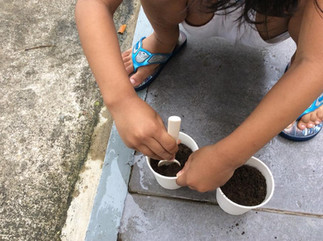Montessori-Inspired Tips for School Readiness: Fostering Independence and Love for Learning
- Teacher Weena
- Aug 7, 2023
- 4 min read
Updated: Mar 1

As a seasoned preschool teacher and devoted early years educator, I've had the privilege of witnessing the incredible impact of the Montessori philosophy and method on young minds. The Montessori approach is more than just an educational model; it's a way of life that cultivates a child's innate curiosity, independence, and love for learning. Before your child enters preschool or kindergarten, parents can help their child get ready for the bigger world ahead. In this blog post, I'll share valuable insights and practical tips on how to incorporate Montessori principles into your child's early education journey, using simple and budget-friendly materials. So, let's dive in!
Montessori-Inspired Tips for School Readiness: Fostering Independence and Love for Learning
1. Embrace the Prepared Environment: Create a dedicated space for your child with low shelves and accessible storage for their toys and materials. This encourages independence and order. Show your child how to put things back in their designated places and watch them take pride in maintaining their space.
Extra teacher tip: Take photos of the toys or materials that you will put on the shelves, print them out and laminate them then stick them to the place where you want the toy returned. This will help your child remember where their toys or things are kept.

2. Focus on Practical Life Skills: Involve your child in everyday tasks to develop their fine motor skills and independence. Teach them how to pour water into a cup, button their clothes, or arrange flowers in a vase. Start with simple tasks and gradually increase the complexity as they master each skill.
Extra teacher tip: Finding it too messy to allow your toddler to pour water into a cup? Take the activity outdoors!


3. Sensory Exploration: Encourage sensory play by filling a bowl with rice or pasta. Provide measuring cups, funnels, and spoons for your child to explore and experiment with. This not only enhances their sensory development but also promotes language skills as they describe the textures and shapes they encounter.
Extra teacher tip: Again, take it outdoors! Seeds, soil, leaves, sand, pebbles, are some of nature's gifts to young children. Them model describing things to them; 'The soil feels cool;' 'The leaf is big because it cannot fit in my hand;' or This tree trunk is a darker brown that this one'
4. Language Enrichment:
Create a language-rich environment by labeling objects around the house. Read books aloud and engage in conversations that promote active listening and communication. Use picture cards with simple words to enhance vocabulary and encourage your child to identify and name objects.
Extra teacher tip: leave books all around the house so your children can just pick up a book where ever and whenever. Don't just limit them to children's books, invest in travel books, atlases, or books about science, geography or history.

5. Numeracy Through Play: Introduce basic math concepts through play. Use buttons, beads, or small toys for counting and sorting activities. Create opportunities for your child to explore concepts like quantity, size, and patterns by asking questions and encouraging them to manipulate the objects.
Extra teacher tip: collect bottle caps, seashells or pebbles and place them in a container with a lid. You and your child can use these for counting, one to one correspondence or to learn other math concepts like 'many' or 'few' 6. Nature Connection: Take nature walks with your child and observe insects or collect leaves and rocks. Encourage them to explore the natural world, fostering a sense of wonder and respect for their environment. Discuss what they see and ask open-ended questions to spark their curiosity.
Extra teacher tip: take zip lock bags along with you on your nature walks to put everything your child picks up or might be interesting. Make sure they don't sting!
7. Artistic Expression:
Provide open-ended art materials like crayons, colored pencils, and plain paper. Allow your child to express themselves creatively without any specific instructions. Encourage them to experiment with different colors and textures, and display their masterpieces proudly.
Extra teacher tip: Paint not just on paper, but on anything your child may be interested in painting.

8. Practical Materials: You don't need elaborate toys to enhance learning. Use recycled containers, buttons, wooden blocks, and fabrics to create DIY materials for exploration. For example, you can turn an empty tissue box into a shape-sorting game or use different fabrics to create a sensory touch board. Let your creativity flow!
Extra teacher tip: I know not all of us are creative and crafty, so why don't we do an exchange of home made materials, cooked home recipes, or even toys in our own community. One mama (or papa) can make 2 sets of lacing cards while the other mama (or papa) can cook a kid friendly meal. Incorporating Montessori principles into your child's early education journey is a gift that keeps on giving. By focusing on practical life skills, sensory exploration, language enrichment, numeracy through play, nature connection, and artistic expression, you're setting the foundation for a lifelong love of learning. Remember, it's not about the fancy equipment, but the meaningful interactions and experiences that shape your child's growth. Embrace the journey and watch your little one blossom into a confident, curious, and capable individual. If you found these tips helpful, I invite you to sign up and subscribe for more valuable resources and insights on nurturing young minds. Together, let's create a bright future for our children!













Comentários